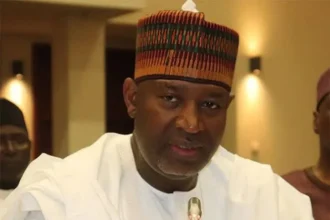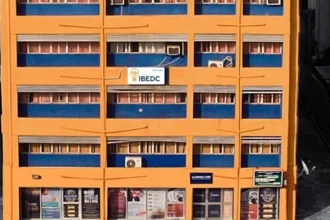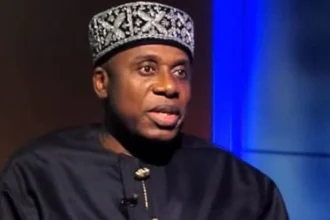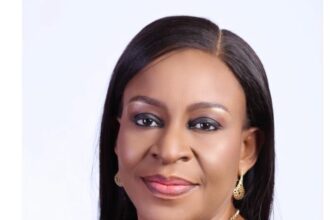...To get all news updates, Join our WhatsApp Group (Click Here)
Also Join our WhatsApp Channel (Click Here)
With the stage set for the Edo State governorship poll tommorrow Wednesday, September 28, Nigerians are waiting with bated breath for a free, fair and transparent election process. But once again, the build-up has been marred by allegations of fraud, even after the elections were postponed. An allegation of connivance to rig the polls was levelled against INEC, the Police and the ruling APC. The PDP in a statement by its publicity secretary, Chris Nehekhare claimed it had credible information that there was an arrangement by the APC to thumbprint fake ballot papers and take them to local councils where its candidate is expected to lose. He further said there was another plot to plant fake permanent voters cards on PDP supporters and get them arrested. Although the Edo the state police command and INEC have in separate reactions, denied the allegation, these are ominous signs that portend to trouble. If, as we say, the morning tells the day, then politicians, their supporters, power mongers, security agencies and all sorts of irredentists who take advantage of such situations of chaos should spare a thought for peace and security in Edo state and indeed the country.
According to the PDP, this sinister plot hatched between the APC and INEC with the connivance of the police was a ploy to manipulate or disrupt the results on the field at polling stations where they may be losing the elections. “They are planning to destabilize the election at Uromi, Ovia and parts of Oredo in order to provoke inconclusive elections in their areas of weakness. We are also reliably informed that members of the APC have been granted remote access to the INEC servers and its e-collation platforms. We are informed that certain officials of the commission had granted the APC real time access to the platforms in furtherance of their plan,” the PDP statement said.
Interestingly, the two governorship candidates, who hail from the ancient Benin Kingdom, have served the state in various capacities and on the platform of the same political party before this contest separated them. This, of course, could make the contest very divisive. On an optimistic note, it could also make it less so! Nigerians hope the latter prevails. What is more, incumbent Governor Adams Oshiomhole who is rounding off his constitutional second term has presided over a relatively peaceful state. While he is entitled to some partisanship as expected of an outgoing governor who would want his legacies consolidated by a successor, the least that is expected of Oshiomhole, a well-known unionist is to help ensure that the will of the Edo people prevails at the ballot box. That is the only way to guard his reputation as a statesman.
The APC governorship candidate, Godwin Obaseki defeated other aspirants at the APC primaries of Saturday, June 18, while Osagie Ize-Iyamu, who will fly the PDP flag, won his party’s ticket on June 20. Ize-Iyamu and Obaseki have both been in the same political camp before going their separate ways.
Ize-Iyamu, a pastor, is a former Chief of Staff and Secretary to Edo State government. He was an APC bigwig before decamping to the PDP. Ize-Iyamu was also the National Vice-Chairman, South-South Zone of the defunct Action Congress of Nigeria (ACN). He was the director general of Oshiomhole’s second term campaign organization in 2012. He had also once coordinated the office of the Goodluck/Sambo campaign organization on the PDP platform.
Obaseki was managing director and board chairman of Afrinvest (West Africa) Ltd until June 2016. He served on the Presidential Committee on the Reform of the Nigerian Pensions System; and also on the Committee on Reactivation of the Nigerian Bond Market set up by Securities and Exchange Commission (SEC). He is an active member of the Nigerian Stock Exchange (NSE) and currently serves in its Governing Council. He has also served on many NSE committees. In 2001, he was nominated Global Leader of Tomorrow (GLT) by the World Economic Forum. He is a Fellow of the Nigerian Chartered Institute of Stockbrokers and an alumnus of the Lagos Business School. He is the founding and current Chairman of Edo State Economic and Strategy Team which was inaugurated by Governor Oshiomhole in March 2009. So, both men come to the race with good enough credentials as managers and politicians.
Next Wednesday’s election offers another important test case for what to expect in 2019 and INEC should seize the moment to send the right signals about its capacity to organize free, fair and credible elections. With only 1,925,105 registered voters, INEC has more than adequate material, personnel and security wherewithal to do a diligent job in Edo, if it wants to. Therefore, there was no excuse for INEC, to have postponed the election from September 10, to September 28 after deploying all the requisite logistics, other than gross incompetence, partiality, corruption and mischief. The postponement of the vote over some imaginary security threats led to all sorts of speculations and opened the electoral umpire to charges of impartiality; and in the process, undermined its own credibility. INEC now has a historic opportunity to try to salvage its increasingly battered public image and gain some measure of public respectability.
As this is the second state-wide election to be organized by new INEC Chairman, Professor Mahmud Yakubu, expectations are high that INEC would discharge itself creditably. The first election on Yakubu’s watch was in Kogi where a strange development neither envisaged by the constitution nor Electoral Act occurred: the presumed winner died before the results were announced and that created a new phrase in Nigeria’s political lexicon – “inconclusive election.” In Nigeria where cynicism, political opportunism and inordinate ambition is the currency of choice of politicians, the prospect of any “inconclusiveness” over the Edo election should be banished by INEC with fairness in its conduct of the poll.
INEC should ensure that Edo politicians are not given any opportunity to engage in a shouting match to the news media when certain hiccups occur. INEC should work hard to plug all loopholes and save itself any embarrassment. The politicians in Edo State must behave in a decorous manner if they are truly out for service to the people, and the security agencies must show a high degree of professionalism and neutrality. Election is a process that has many components and stages. The Election Day itself is however the most critical, when its integrity can be easily compromised and outcome discredited. Once trust, the building block of credibility of the process is doubtful, people and observers automatically suspect injustice and that can be the trigger of widespread violence.
Politicians, their supporters, power mongers, security agencies and all sorts of irredentists who take advantage of the absence of an Election Offences Tribunal should spare a thought for peace and security in the state and indeed the country. All told, the people of Edo State should also be conscious of the fact that extant electoral laws empower the election umpire, INEC, to suspend or cancel elections where actions are suspected to have compromised the integrity of the process. That is why all Nigerians need to reflect on the implications of their negative attitude before, during and after elections. The people of Edo should realize that they are the source and the pillars of democracy and good governance. They owe themselves the duty to make it work in their State. They should help deepen democracy by voting peacefully on Wednesday and ensuring that all votes count.
You can get every of our news as soon as they drop on WhatsApp ...To get all news updates, Join our WhatsApp Group (Click Here)
Also Join our WhatsApp Channel (Click Here)









